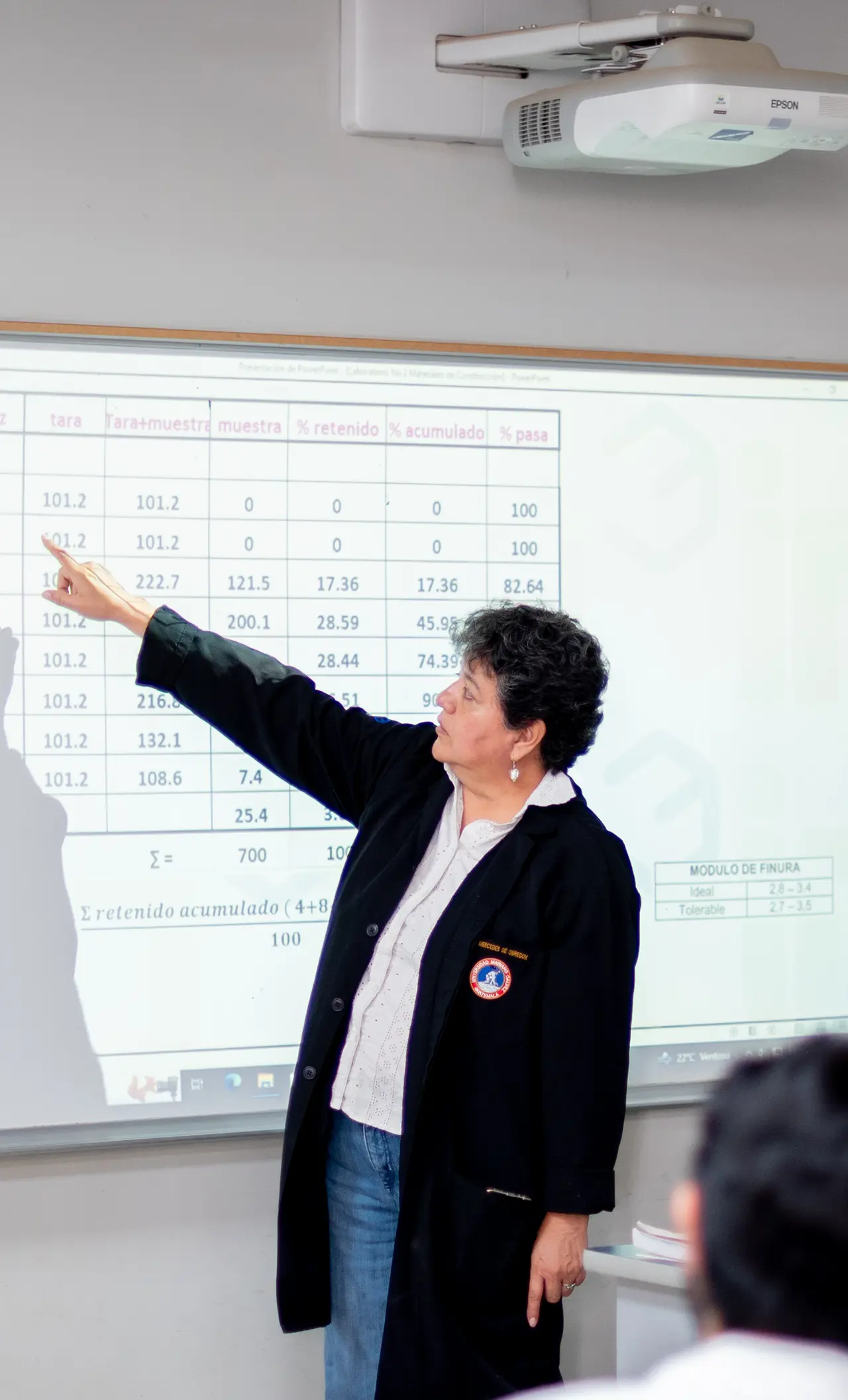
- Bachelor's Degree in
- Data Science and Analytics Engineering
- Degree to be obtained
- Bachelor's Degree in Data Science and Analytics Engineering
- Academic degree
- Bachelor's Degree
- Duration
- 5 years
- Modality
- In-person and virtual
- Schedule:
- Weekdays and Saturday session
- Career description
-
The Data Engineering and Analytics degree aims to train professionals (Data Scientists) who are able to manage, operate and analyze large amounts of data, using different mathematical models with the help of computer technologies and thus obtain information for the solution of different problems and decision making.
- What will you learn during the program?
-
Professionals who are able to manage, operate and analyze large amounts of data using different mathematical models and with the help of computer technologies.
Gallery
AdmissionProfile
- Possess a general knowledge of the field of Data Engineering and have an inclination for it.
- The aspiring Data Science and Analytics engineer should be a person with knowledge and skills in mathematical and computer sciences.
- They should have skills and knowledge to communicate in oral and written form in a satisfactory manner.
- Must have the ability to solve problems.
- General knowledge of national and international social issues is required.
- Must possess sensitivity, creativity and social commitment.
Graduate'sProfile
The Data Science and Analytics Engineering graduate will be able to
- Apply the basics of applied and oriented computer science in conjunction with advanced mathematics and statistics in data processing and analysis.
- Manage large volumes of data, from the design of data recording systems and their processing, perform the respective data analysis using specific tools, generate data visualization and analysis reports for management and decision-making.
- Design and evaluate descriptive, predictive and prescriptive mathematical models to create solutions to specific problems.
- Work in the fields of data analysis, business analyst, information analyst, designer of predictive tools in different industries in Guatemala.
Career Opportunities

- IT engineers, programmers, statisticians, graphic designers and experts in the development of a company's products or services, by extracting and analyzing big data. Work together with administrators.
- Provide strategic advice to solve problems derived from the management of Big Data, considering the trends in methodologies and tools for the management of these.
- Create preliminary projects for data management systems in order to integrate, centralize, protect and maintain protocols for data quality verification.
- Understand how organizational functions are performed and how data should be collected, analyzed and used.
- Use technical data visualization tools to analyse and present complex trends.
- Solve problems, through the development of algorithms, involving large volumes of data from different sources and application domains.
Curriculum
| 1° Ciclo | ÁLGEBRA SUPERIOR | ALGORITMOS Y FUNDAMENTOS DE PROGRAMACIÓN | ANÁLISIS Y ADMINISTRACIÓN DE DATOS CON HOJAS ELECTRÓNICAS | DESARROLLO HUMANO Y PROFESIONAL | HERRAMIENTAS PARA LA CIENCIA DE DATOS | |
|---|---|---|---|---|---|---|
| 2° Ciclo | ÁLGEBRA LINEAL I | CÁLCULO I | HISTORIA Y FILOSOFÍA DE LA CIENCIA | LEGISLACIÓN PARA INGENIEROS | PROBABILIDAD Y ESTADÍSTICA PARA LA CIENCIA E INGENIERÍA I | PROGRAMACIÓN PARA LA CIENCIA E INGENIERÍA I |
| 3° Ciclo | ÁLGEBRA LINEAL II | CÁLCULO II | MATEMÁTICA DISCRETA I | PROBABILIDAD Y ESTADÍSTICA PARA LA CIENCIA E INGENIERÍA II | PROGRAMACIÓN PARA LA CIENCIA E INGENIERÍA II | SISTEMAS DE INFORMACIÓN GEOGRÁFICA |
| 4° Ciclo | CÁLCULO VECTORIAL Y MULTIVARIABLE | MATEMÁTICA DISCRETA II | PROBABILIDAD Y ESTADÍSTICA PARA LA CIENCIA E INGENIERÍA III | PROGRAMACIÓN AVANZADA | VISUALIZACIÓN, EXPLORACIÓN Y ADQUISICIÓN DE DATOS | |
| 5° Ciclo | ESTADÍSTICA GEOESPACIAL Y ANÁLISIS DE DATOS ESPACIALES | ESTRUCTURA DE DATOS | MODELACIÓN MATEMÁTICA APLICADA | PROBABILIDAD Y ESTADÍSTICA PARA LA CIENCIA E INGENIERÍA IV | PROGRAMACIÓN DE PÁGINAS ELECTRÓNICAS Y APLICACIONES MÓVILES | |
| 6° Ciclo | DISEÑO DE BASE DE DATOS ESTRUCTURADAS | ESTADÍSTICA APLICADA I | LENGUAJES DE PROGRAMACIÓN PARA INTELIGENCIA ARTIFICIAL | MÉTODOS NUMÉRICOS | PROGRAMACIÓN PARA LA CIENCIA DE DATOS | |
| 7° Ciclo | DISEÑO DE BASE DE DATOS NO ESTRUCTURADAS | ESTADÍSTICA APLICADA II | INTELIGENCIA ARTIFICIAL | MINERÍA DE DATOS ESTRUCTURADOS | PROCESOS ESTOCÁSTICOS | |
| 8° Ciclo | ANALÍTICA DE DATOS | APRENDIZAJE AUTÓNOMO (MACHINE LEARNING) | DISEÑOS ESTADÍSTICOS | INTRODUCCIÓN A LA MATEMÁTICA COMPUTACIONAL PARA LA CIENCIA D | MINERÍA DE DATOS NO ESTRUCTURADOS | SERIES DE TIEMPO Y PRONÓSTICOS |
| 9° Ciclo | APRENDIZAJE PROFUNDO (DEEP LEARNING) | COMPUTACIÓN EN LA NUBE Y DATOS MASIVOS (CLOUD COMPUTING AND | INTELIGENCIA COMERCIAL (BUSINESS INTELLIGENCE)( | INTRODUCCIÓN A LA TEORÍA DE DECISIONES CON ANALÍTICA DE DATO | INTRODUCCIÓN AL ANÁLISIS TOPOLÓGICO DE DATOS | SOFTWARE PARA DATOS Y ANÁLISIS ESTADÍSTICO |
| 10° Ciclo | ANALÍTICA APLICADA A MERCADOTECNIA, FINANZAS Y DATOS MASIVOS | DESARROLLO DE APLICACIONES PARA EL ANÁLISIS DE DATOS | INTRODUCCIÓN A LA ANALÍTICA APLICADA A LA EVALUACIÓN DEL RIE | INTRODUCCIÓN A LA CRIPTOGRAFÍA Y SEGURIDAD DE DATOS | TEMAS SELECTOS DE ANALÍTICA AVANZADA Y CIENCIA DE DATOS |


